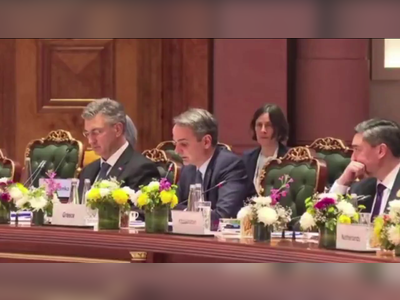
As Germany ends nuclear era, activist says there is still more to do
A few days after it occurred he waved a damp cloth out of a window at the University of Vienna to sample the city's air and was shocked by how many radionuclides could be seen under a microscope.
"Technetium, Cobalt, Cesium 134, Cesium 137 ...Chornobyl was 1,000 kilometres away ... That made an impression," Smital, now 61, said as he told Reuters about his life-long activism against nuclear power in Germany.
On Saturday Germany will shut off its last three reactors, ending six decades of nuclear power which helped spawn one of Europe's strongest protest movements and the political party that governs Berlin today, the Greens.
"I can look back on a great many successes where I saw injustice and many years later, there was a breakthrough," Smital said, showing a photo of himself in 1990s in front of the Unterweser Nuclear Power Plant, which was closed in 2011 following the Fukushima disaster in Japan.
Former Chancellor Angela Merkel responded to Fukushima by doing what no other Western leader had done, passing a law to exit nuclear by 2022.
An estimated 50,000 protesters in Germany formed a 45-kilometre long (27-mile) human chain after the Fukushima disaster from Stuttgart to the Neckarwestheim Nuclear Power Plant. Merkel would announce Germany's planned nuclear exit within weeks.
"We really stood hand in hand at a certain point in time. I was also in the chain ... It was impressive how that formed," Smital said.
"That was a great feeling of a movement and also of belonging ...a very nice, communal, exciting feeling that also develops a power," Smital said.
One of the long-running movement's early successes came in the 1970s when it managed to get plans for a nuclear plant in Wyhl in western Germany overturned.
THE GREENS
In parallel, a divided Germany during the Cold War also saw a peace movement evolve amid concerns among Germans that their land could become a battlefield between the two camps.
"This produced a strong peace movement and the two movements reinforced each other," said Nicolas Wendler, a spokesperson for Germany's nuclear technology industry group KernD.
Moving from street protests to organised political work with the establishment of the Greens party in 1980 gave the movement more power.
It was a Greens-coalition government that introduced the country's first nuclear phase-out law in 2002.
"The nuclear phase-out is a Greens project ... and all parties have practically adopted it," said Rainer Klute, head of pro-nuclear non-profit association Nuklearia.
On Saturday, both Smital and Klute stood as protesters at Berlin's Brandenburg Gate, one celebrating the end of nuclear power, the other lamenting its demise.
"We have no other choice but to accept the phase-out for the time being," Klute said.
Yet for Smital, the reactor closures do not mean the end of his activism.
"We have a uranium fuel assemblies factory in Germany ... we have uranium enrichment, so there is still a lot that needs to be discussed here and I will be on the street a lot ...very gladly," he said.











